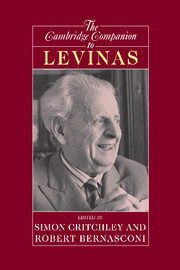Book contents
- Frontmatter
- 1 Introduction
- 2 Levinas and Judaism
- 3 Levinas and the face of the other
- 4 Levinas's critique of Husserl
- 5 Levinas and the Talmud
- 6 Levinas and language
- 7 Levinas, feminism and the feminine
- 8 Sincerity and the end of theodicy
- 9 Language and alterity in the thought of Levinas
- 10 The concepts of art and poetry in Emmanuel Levinas's writings
- 11 What is the question to which 'substitution' is the answer?
- 12 Evil and the temptation of theodicy
- Bibliography
- Index
4 - Levinas's critique of Husserl
Published online by Cambridge University Press: 28 May 2006
- Frontmatter
- 1 Introduction
- 2 Levinas and Judaism
- 3 Levinas and the face of the other
- 4 Levinas's critique of Husserl
- 5 Levinas and the Talmud
- 6 Levinas and language
- 7 Levinas, feminism and the feminine
- 8 Sincerity and the end of theodicy
- 9 Language and alterity in the thought of Levinas
- 10 The concepts of art and poetry in Emmanuel Levinas's writings
- 11 What is the question to which 'substitution' is the answer?
- 12 Evil and the temptation of theodicy
- Bibliography
- Index
Summary
It seems to be generally accepted that the analysis of 'internal timeconsciousness' is not only the foundation on which the entire edifice of Husserl's transcendental phenomenology rests, but that it also remains an obligatory reference point for any phenomenologist concerned with the question of time. This is certainly true of Merleau-Ponty and Ricoeur, but it is also true of Heidegger, Levinas and Derrida, who are nevertheless reluctant to subscribe entirely to the Husserlian analysis of temporality and temporalization. It is almost as if the Husserlian descriptions of the experience of time contained within themselves the seeds of a surpassing of the philosophical framework in which Husserl had inserted them. We are then confronted with the paradox whereby an analysis of time that was to have provided a foundation for a phenomenology of an egological transcendental consciousness constitutive of objects by justifying their epistemological validity also retains a large part of its value in an ontological phenomenology of Dasein or in an ethical phenomenology of the other person who appears in the form of the 'face' or the 'appeal'.
- Type
- Chapter
- Information
- The Cambridge Companion to Levinas , pp. 82 - 99Publisher: Cambridge University PressPrint publication year: 2002
- 7
- Cited by



